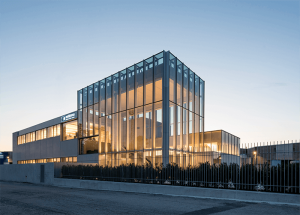Eco-friendly aluminium: introducing exlabesa’s Clean Planet Initiative,
exlabesa Building Systems UK General Manager, Paul Benn, explains how the company’s Clean Planet initiative has seen it commit to achieving a greener, healthier world.
It might be hard to imagine now, but the biggest threat we face as a society isn’t coronavirus.
It’s certainly caused huge disruption, radically changed the way millions of us live and work, and become the top priority for governments around the world.
But as vast as its impact has been, in the long-term, it’s climate change that poses a far bigger risk.

A huge task, and a big role to play
In the last few years, it’s become more and more obvious that we’re facing an environmental crisis.
In 2019, the planet’s leading climate scientists declared that we’ve got twelve years to avoid global temperatures rising above 1.5 degrees Celsius – at which point droughts, floods, heat waves and other extreme weather events will become much more common.
Shortly after, Britain became the first developed country in the world to declare a climate emergency, and commit itself to reducing carbon emissions to zero by 2050.
It’s a huge task – now made even more challenging by the disruption caused by coronavirus. Like it or not, in fenestration and construction more generally, we’ve got a big role to play in ensuring that target gets met.
Going green will become a necessity
In Britain, construction causes 45% of our carbon emissions, as well as 32% of landfill waste.
More broadly, the built environment is responsible for between 25 and 40% of total energy use in developed countries, and 30% of raw material use. It accounts for 30-40% of world carbon emissions.
That means that sectors like ours have a moral responsibility to do whatever we can to reduce that environmental impact – not just by designing and supplying products that are as eco-friendly as possible, and offer outstanding thermal efficiency, but also by reducing our own carbon footprints as individual businesses.
And given that governments, regulators, the commercial sector and the public in general are now more environmentally-conscious than ever, being as green as possible is likely to become a necessity if you want your business to succeed.
We already know that 56% of consumers now consider sustainability when choosing products – something that’s bound to filter up from homeowners, to installers and then to fabricators.
21% of people claim they’re more likely to buy a product that clearly displays its environmental credentials on the packaging – and nearly three-quarters of millennials are willing to pay a higher price for a product they think has a positive environmental impact.
Nearly 80% less carbon emissions
That’s why, at exlabesa, we’ve launched our Clean Planet initiative. 
Aluminium was already an excellent material from an environmental perspective. It’s 100% recyclable, and thanks to the invention of polyamide thermal break technology, can offer superb energy efficiency.
But we knew we could go further. We took the decision to invest in our own aluminium recycling facilities (located in Spain), and begin manufacturing recycled aluminium billets, significantly reducing our environmental impact.
Making one kilo of our recycled aluminium produces 3.67kg of carbon. The global average is 18kg per kilo, meaning we’re producing 79.6% less carbon.
Our state-of-the-art smelting furnaces produce these recycled billets, which we then use to extrude new profile – which ultimately results in aluminium with a virtually infinite lifespan.
What’s more, aluminium recasting uses just 5% of the energy used in producing primary aluminium.
With effort and perseverance, we can achieve a greener world
For us, and for businesses like ours throughout fenestration, there’s still a lot more work to do to ensure the sector is as green as it can possibly be.
But we’re confident that with dedication and perseverance, the glazing sector can and will significantly cut its environmental impact, and help the shift towards a cleaner, greener, healthier world.
For more information please call 01302 762500 or visit cleanplanet exlabesa